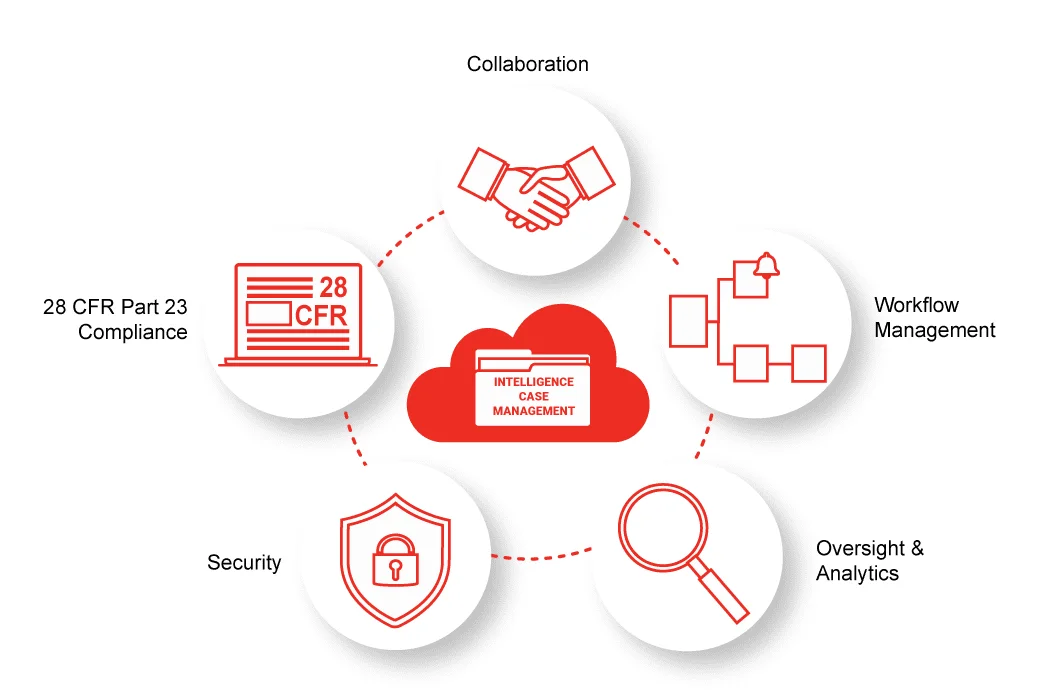However, many units managing intelligence investigations are still trying to manage their growing caseloads with spreadsheets and other archaic, manual case management systems that are preventing them from gathering information as efficiently and effectively as possible. In this blog, we’ll discuss what the primary duties are for criminal intelligence investigators, why case management software is so critical for day-to-day operations, and how CaseBuilder™ can help.
What Are the Primary Duties of Criminal Intelligence Investigators?
The fundamental responsibility of a criminal intelligence investigator is to investigate trends and criminal enterprises that are likely to produce more criminal activity in the future.
As an example, consider a scenario where several people in a vehicle have been arrested for illegal possession of ghost guns. Let’s say the officer making the arrest notices that the subjects all have similar tattoos and flash hand symbols to each other while in custody. The arresting officer suspects that these people are part of a criminal street gang and sends a field intelligence report to the intelligence unit stating these observations. The intelligence unit then has a predicate to open an investigation to determine whether these people are indeed part of a criminal street gang, and if so, if that criminal gang is operating a gun trafficking operation (aka a criminal enterprise).
Intelligence investigators involved in this scenario will recognize that while some members of the gang have been arrested, that probably won’t stop the trafficking of illegal guns in the community. Instead, gun trafficking will most likely be continued by other gang members since it produces income for the gang. Therefore, this intelligence investigation work becomes all the more critical for preventing future criminal activity and actually stopping the supply of illegal guns that are used in violent crimes on the streets.
As part of their investigation, the intelligence team will do an analysis of the people who were arrested to see if there is anything in their background that might tie them to the criminal enterprise and other potential gang members, and continually dig deeper to learn more about the activity and associations of these individuals. They also may conduct surveillance, debrief confidential informants, and search for linkages between the criminal enterprise and other criminal activity.
If the intelligence team can develop probable cause that the gang is indeed trafficking guns, they would brief leadership, and agency leadership would determine the next steps to leverage the intelligence. These next steps could include infiltrating the gang with undercover operatives and executing search and arrest warrants. At this point, the intelligence team’s work is essentially done. Their mission was to develop actionable intelligence that can prevent, deter, or solve crimes. Of course, they might continue to support the ongoing activities, and their testimony will likely be instrumental to securing convictions, but their main mission of developing actionable intelligence has been accomplished.
So, now that we’ve discussed some of the types of tasks that a criminal intelligence investigator may encounter, let’s now review why a case management system can be so critical for the day-to-day operations in an intelligence investigation.
#1: Confidentiality of Data and 28-CFR Compliance
In a highly regulated profession like law enforcement, information security, and compliance are paramount. From interviews with confidential informants to investigations into potential gang members’ backgrounds, intelligence investigators are dealing with highly sensitive information and need to ensure that only those who are authorized to review the information can do so.
28 CFR Part 23, a governing regulation of criminal intelligence systems, provides guidelines for the protection of constitutional rights and reasonable expectation of privacy. Guidelines cover data collection, inquiry, dissemination, review and purging or validation of data at regularly prescribed intervals, and security. Utilizing a case management software solution that maintains 28-CFR Part 23 compliance is ultimately a no-brainer for investigative departments focused on maintaining the highest standards of integrity over the course of their investigations.
#2: Secure, Cloud-Based Capabilities
Compared to a number of other industries, law enforcement has been slower to embrace cloud technologies. However, the tide is changing as more departments are recognizing the benefits of the cloud as it relates to reliability, accessibility, affordability, and scalability. By leveraging the cloud, intelligence investigators are better equipped to accomplish a variety of tasks, from uploading, storing, and securing massive quantities of data from mobile devices, to dictating and submitting incident reports from the field, and more. Providers like AWS offer a GovCloud that adheres to the DOJ’s Criminal Justice Information Systems (CJIS) Security Policy among other stringent compliance requirements.
#3: Seamless Collaboration & Powerful Analytics
The duties of intelligence investigators require regular collaboration with others in the intelligence field and if a crime has been committed, with a criminal investigation team. To effectively collaborate on complex case details, investigators need analytical capabilities such as cross-referencing, tracking, and tagging of data. Analytical tools help investigators detect relationships between people, places, vehicles, and evidence, aiding significantly in the process of investigations when time is of the essence. Additionally, in the event of agency turnover, a new investigator can be quickly brought up to speed if the team is already working in a cloud-based, highly secure platform that offers ease of collaboration.
How CaseBuilder Can Help
CaseBuilder is a proven, cloud-based case management software solution that empowers criminal intelligence investigators to gather, analyze, and share information more efficiently, effectively, and securely while maintaining 28-CFR compliance.
With CaseBuilder, your team can capture all case information including documents, images, and video, in one place via a centralized, secure, case folder. Fully compliant encryption and cloud-based audit logs help ensure compliance with governance requirements, and automated reminders ensure timely review and purging of outdated information. Designed to meet the most stringent industry standards, CaseBuilder integrates seamlessly with all leading industry information systems and fosters collaboration with internal and external stakeholders.
Better Tools Translate to Better Results
Criminal intelligence investigators should not have to operate in the dark ages, stuck with homegrown systems that make gathering and securing actionable intelligence such a challenge. With better tools, criminal intelligence investigators can focus more on the tasks that matter—preventing future criminal activity.






